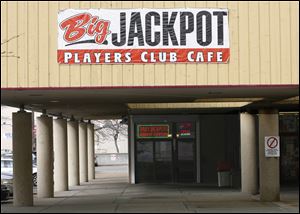
Ohio lawmakers seek crackdown on Internet cafes
State alleges illegal gambling happens at sites
11/26/2012
Players Club Cafe in East Toledo is one of 49 establish-ments in Lucas County registered with the state.
COLUMBUS — Ohio lawmakers may be about to crack down on hundreds of Internet “sweepstakes” cafes that the state contends are illegal gambling parlors in disguise.
The General Assembly may take advantage of the lame-duck legislative session’s waning days to send Gov. John Kasich a bill to narrow, if not close, the loophole in Ohio’s seemingly ever-changing gambling law that has allowed such businesses to proliferate.
Attorney General Mike DeWine would prefer an outright ban but, absent that, welcomes strict regulations on their operation.
“There are over 800 gambling establishments with no regulation,” Mr. DeWine said. “The status quo of doing nothing makes no sense. There is no other form of gambling out in the open in the state of Ohio that is not thoroughly regulated by the state. … We do background checks on owners and the people who work there. We follow the money to see where the money’s going, what the payout is. These are all basic things done in regard to other forms of gambling.”
Such businesses typically sell prepaid phone cards or Internet minutes to patrons in exchange for plays on onsite electronic “sweepstakes” games that offer cash payouts or other prizes.
Earlier this year, lawmakers imposed a moratorium, through June 30, 2013, on the opening, expansion, or relocation of sweepstakes cafes, to at least temporarily stop their spread while the state figures out what to do. The law required existing establishments to register with Mr. DeWine’s office, and a surprising 819 did — 49 of them in Lucas County.
State Reps. Louis Blessing (R., Cincinnati) and Matt Huffman (R., Lima) recently introduced House Bill 605 to at least remove the profit incentive behind such businesses. But despite those lawmakers’ roles in House leadership, Mr. Blessing stressed there is no agreed-upon language going into legislative hearings.
The cafes “are cutting into the state’s revenues from casinos and the tracks — not only the state but all those other groups that receive money from those entities as spelled out in the constitution,” he said. “I’m a pro-gambling guy, but I don’t want it on every street corner. It’s a problem.”
The two-year legislative session will conclude before the year’s end. Any bills not passed at that time will have to restart the process next year.
Mr. DeWine had wanted lawmakers to deal with the issue when they passed far more sweeping legislation this year affecting casinos, racetrack slots, horse racing, lottery, and other legal forms of gambling in Ohio. But lawmakers were stymied about what to do and settled on the moratorium instead.
Local law enforcement agencies have gone after such cafes in the past, but they’ve sometimes had difficultly making charges stick as judges cite flaws in existing law as it applies to sweepstakes.
In 2009, Municipal Judge Francis X. Gorman, who now is retired, threw out misdemeanor gambling charges against Robert Dabish, owner of the Players Club Café in East Toledo. The Main Street business is one of four Players Club Cafes that Mr. Dabish owns in Toledo and Oregon that he has since registered with the state.
“The basis of the not-guilty finding was that there was nothing at risk,” said Jon Richardson, Mr. Dabish’s attorney in the case. “Gambling is defined as having to have consideration, risk, and reward. When a patron came into the Internet cafe, he bought long-distance telephone minutes that he can’t lose no matter how the game turns out. There is no risk of loss. You can’t have gambling if you can’t lose.”
House Bill 605 would prohibit the sale of prepaid phone cards, Internet time, or other products at above-market prices to customers in exchange for plays on computerized games that offer cash payouts or other prizes, even if the outcomes of those games are predetermined.
It also would prohibit customers from using more than 50 percent of such phone cards’ value at any one location.
Mr. Blessing said it would be “nigh near impossible” for such cafes to legally offer gambling under such conditions. The idea is to go after them without outlawing legitimate sweepstakes, such as McDonald’s popular Monopoly game.
The bill would empower the Bureau of Criminal Investigation and Identification to investigate what would be labeled criminal enterprises under the bill, as well as require the Ohio Lottery Commission to develop rules of what constitutes a “scheme of chance.”
The Fraternal Order of Police of Ohio last week urged lawmakers to pursue a statewide ban.
“We believe these establishments are, at best, illegal gambling operations, and at worse fronts for other more serious criminal activity,” FOP President Jay McDonald wrote in a letter to Mr. DeWine and major-party legislative leaders.
“Despite protests to the contrary, experience has shown us that what happens inside Internet gambling cafes is, in fact, gambling,” he wrote. “Local law enforcement has no choice but to treat it as such.”
In its own letter, the Ohio Prosecuting Attorneys Association also backed an outright ban, not regulation.
Regulation “assumes continued operation, and we believe that regulation would be inconsistent with the fact that they are illegal under current law,” wrote John Murphy, the association’s executive director.
Contact Jim Provance at: jprovance@theblade.com or 614-221-0496.